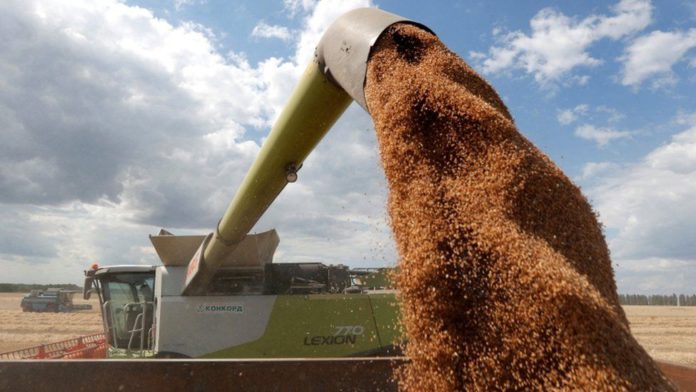The international community should help create a “safe passage” to enable the millions of tons of grain stuck in Ukraine to leave the country, its deputy PM has said.
Yuliia Svyrydenko, First Deputy Prime Minister of Ukraine, told the BBC that some sort of “corridor” was needed.
Ukraine’s inability to export its grain has led to global food prices soaring.
It has also raised the prospect of famines in the countries which depend on its exports.
Ms Svyrydenko, who is also Ukraine’s Minister of the Economy, urged the international community to help lift the blockade of the country’s sea ports.
She said this could be a “solution” allowing Ukraine to export the grain currently stuck in its silos and unable to be shipped.
“We need the assistance of our international partners, to secure our exports through the sea ports… to find a way to build a corridor, or another solution, how to give an opportunity to Ukrainian vessels [to export via the Black Sea],” she said. “A safe passage.”
She hinted that military means might be necessary to achieve this.
“We need a guarantee from partners, of course it’s a defence guarantee, a security guarantee, to be able to export [using] these vessels,” Ms Svyrydenko said.
“And to make it, not once but on a regular basis. That is most important.”
Ukraine’s wheat exports plunged after the Russian invasion.
As wheat prices soared on world commodity markets, the cost of everything from bread and cakes to noodles and pasta has gone up.
Ukraine is able to export small quantities of its commodities by river, rail and barges on the Danube river.
But Ms Svyrydenko warned those routes are insufficient.
“I think if you calculate it would take us five, six, seven years to export all these agricultural yields by these routes. So right now it’s extremely important for us to unblock the seaports and we apply to our partners to do this,” she said.
“The world needs it because Russia threatens the world with world hunger and the only way to solve this problem is to unblock the sea ports.
“If we don’t give farmers the opportunity to export their goods, for them there won’t be any sense in going to the next growing season,” she continued.
Another item on the agenda, was how to make use of assets affected by international sanctions, Ms Svyrydenko said.
Ukraine made clear in March that it believed the assets belonging to Russian oligarchs and Russian central bank funds that have been frozen should be used to finance the rebuilding of Ukraine.
“We should take them and [use] them for the reconstruction of Ukraine,” she said. “Otherwise what was the sense in freezing those assets, if no Ukrainian [would] receive them?”
“We just need to find a clear procedure for how to get these funds,” Ms Svyrydenko said.
Everything from railways stations to factories would need to be rebuilt, she said. Ukraine has estimated the amount of money needed to rebuild the country at around $600bn.
Last week, European Commission President Ursula von der Leyen said the EU was examining how the frozen assets of Russian oligarchs could be used to pay for the reconstruction of Ukraine after the war.

